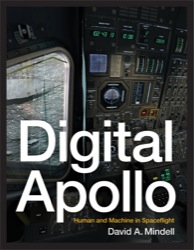
Have you ever thought about how amazing it was when the Apollo space missions actually took someone to the moon considering that they didn’t have the fancy technology we have today? This book recounts the design and use of the on-board Apollo digital computers.
In the 1960s, the United States had a focus: beat the Russians to the moon. Amazing feats of engineering and bravery were accomplished with the entire country backing the NASA Apollo space program. To this day, I have the highest respect for the people who worked on these projects and achieved such amazing goals without the help of modern-day computers and their ability to run endless simulations and model every possible scenario. Those engineers and astronauts in the 60s did it with clear thinking, hard work, and solid design principles.
One of the amazing pieces of technology which resulted from their work was the Apollo Guidance Computer (AGC) on-board computer which helped the Apollo missions navigate properly. These ancient (in computer time) machines were built from individual transistors and used a type of memory almost nobody has heard of which uses magnetic coils wrapped around a piece of iron. The AGC processor module even had interrupts like modern processors, which allowed certain events to grab the computer’s attention for immediate handling.
These computers weight upwards of 70 pounds and had the computing power available today in a small $2 AVR or PIC microcontroller. It’s amazing how far computers have come in the past several decades. Yet, while I do enjoy using microcontrollers to build my projects, there’s something “utilitarian” about them — they’re not exciting or pushing the envelope like the Apollo Guidance Computer did. Those engineers that got to work on the Apollo missions truly were leading the charge into the future and we are the benefactors of their work today.
Check-out Digital Apollo and read the excerpts to decide if you want to take a tiny step back in time.
Thanks to SparkFun for letting me know this book is available.